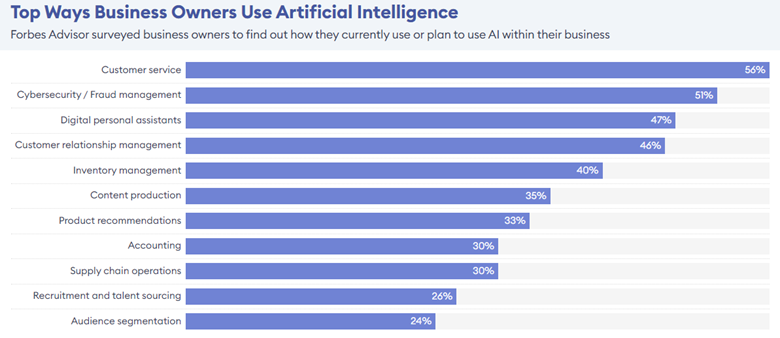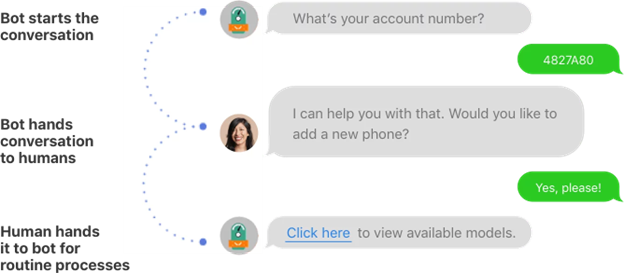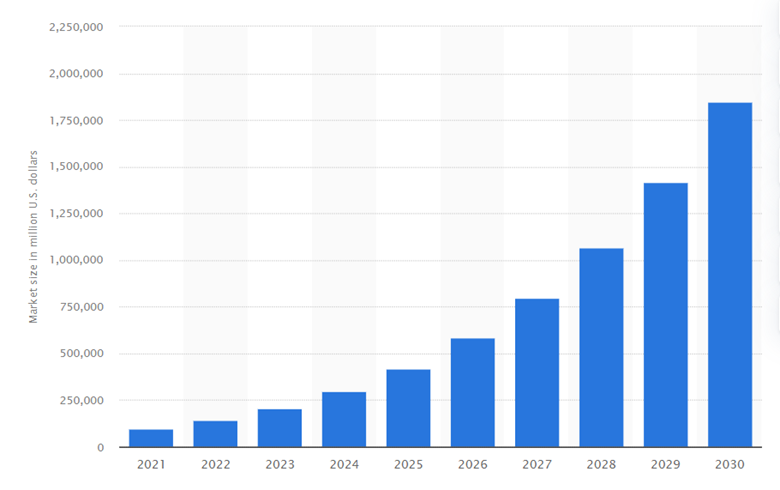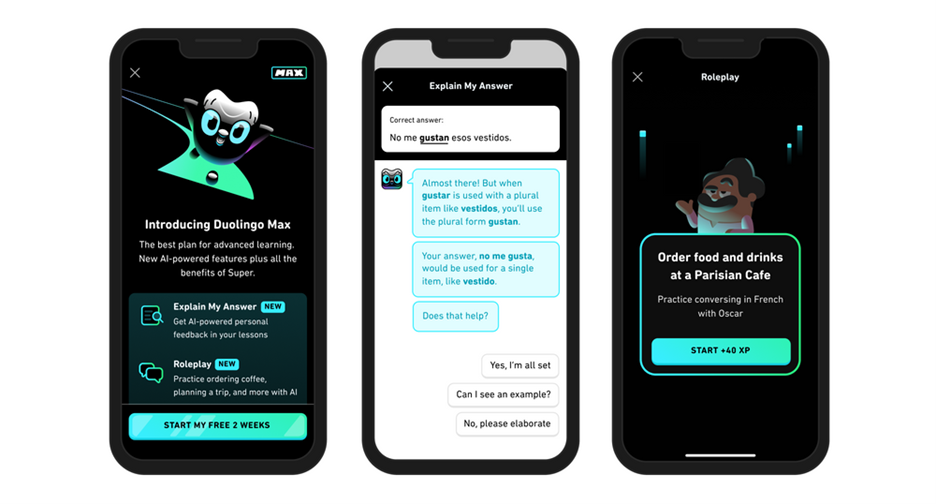In today’s digital age, where technology is evolving by the minute, Artificial Intelligence (AI) is setting new boundaries. It is no longer a concept from futuristic sci-fi movies. It has become a reality that has everything to do with the present and is changing the way we live and work.
From talking to virtual assistants like Alexa and Siri to self-driving cars, AI is gradually becoming an important part of our regular activities.
In this article, we are exploring how AI is being used heavily in the world of business, its advantages, and its limitations.
Table of Contents:
Artificial Intelligence – What is It?
AI is a process of training computer systems or machines to perform functions that require human intelligence. It is a new-age technology capable of learning and solving problems with the help of algorithms that replicate the workings of the human brain.
AI is programmed to create intelligent machines that are capable of making logical and rational decisions just like human beings. This includes a variety of applications like machine learning, natural language processing (NLP), and data analytics.
Machine learning trains computers to access volumes of data and learn from it. The machine can then spot patterns and make predictions without the need for detailed programming. It is almost like a digital brain, constantly being fed information to improve its understanding and decision-making abilities.
Let’s take the example of Google. It can translate text between any set of languages instantly, without any human intervention. This is possible because Google Translate can inspect millions of documents written in various languages. It can then learn which word combinations tend to appear with each other in different contexts.
Why Artificial Intelligence is Important For Businesses
Unless you have been living under a rock, you know that businesses of all niches and sizes like to implement automation in their processes wherever possible. This is where AI has found its forte and become an indispensable solution for companies to reduce their dependence on manpower.
A PWC report in 2023 shows that 86% of CEOs agree that AI is an integral part of their operations as unmanned assistants to their daily functioning.
It is constantly reshaping the way businesses operate by increasing efficiency, streamlining processes, and improving the customer experience. AI-driven automation optimizes routine tasks. This enables you to focus your human resources in other areas.

AI systems enhance the accuracy and speed of business processes, saving valuable time and resources as a result. It also boosts customer engagement by creating personalized experiences based on their preferences.
A wealth of new opportunities are emerging as AI keeps being implemented by more and more enterprises. They can bring rapid innovations to their products and services, and that too by bearing a fraction of the effort and expenses.
AI’s Impact On Business – A Detailed Look At Its Advantages
Implementing AI is like having a super-smart assistant who can do things faster and better. Let us study some of the primary benefits of integrating this technology into your business.
Enhance Customer Experience and Satisfaction
A Zendesk study in 2023 suggests that 70% of consumers purchase from sellers who provide quick and satisfactory customer service. With the ever-increasing needs of clients, staying ahead of them may get challenging.
This is where AI is offering a major remedy. It is being used to create enjoyable interactions with users and existing customers. Technologies like chatbots and virtual assistants are relieving humans of a significant part of their jobs and ensuring instant responses to customer issues.
The many upsides of using AI in this field include improved workflow, faster responses, data analysis and prediction, improved satisfaction, fraud detection, and better security.
Here are some of the ways in which AI is being deployed to deal with customer service.
Chatbots
These are the first things that come to our minds when we think of AI. Chatbots are among the first and most effective AI tools to be implemented for serving consumers. While most leading businesses already have these bots in use, others are looking to hire chatbot developers to enhance their customer support.
They use natural language processing and are programmed to understand the customer’s requirements and provide the necessary solutions. This saves you from having employees sit by the phone or PC around the clock. It also ensures that your customers can get their problems solved at any hour.
Augmented Messaging
Chatbots can be useful in dealing with minor and moderately important issues. But for more sensitive cases, human operators are still irreplaceable. Augmented is an AI tool designed for these very situations.
It spots cases where human agents should deal with the customer’s issues for a personalized touch.

Sentiment Analysis
Sentiment analysis helps you to interpret customer responses based on behavior and language used. It can then direct bots on how to respond to the customer’s inputs and requirements. This helps in diffusing tense situations and simplifying complex ones.
Self-service Resources
Writing detailed FAQ pages and building comprehensive knowledge bases is a time-consuming job, but is crucial for a good customer experience (CX). With AI writing tools like ChatGPT and Jasper.ai, you can assemble existing information and pick out relevant parts. You can then use it to create informative articles or produce answers to frequent questions about your brand and product.
Voice Assistance
Voice analysis with AI has led to the automation of a sizable part of call center conversations. AI tools can be programmed to verbally respond to customer queries in the initial stages of the call.
For example, when you call any customer service, most of the time a voice asks you to make inputs on your phone based on the nature of your query. After a few such steps, you are connected to the executive in charge of answering these types of questions.
This is AI in action. During the initial steps, the bot narrowed down the inputs given by you to determine the exact nature of your issue and then connected you to the most suitable person to resolve it.
Improve Workflow Efficiency and Productivity
An efficient workflow is integral for any business to survive in a constantly evolving market. Taking care of this department, AI is establishing itself as a strong force and remodeling the way business operations are handled.
Artificial Intelligence can streamline business processes and automate routine functions. For instance, with chatbots handling basic customer service issues, human operatives can divert their attention to more complex matters.
Moreover, AI can also be integrated into supply chain management systems. It can help with quality management, product verification, inventory management, and waste reduction. This is why E-Commerce companies are seeking the help of artificial intelligence developers for automated solutions.
Ai-driven finance software can be used to evaluate huge amounts of data and identify opportunities and threats. This enables businesses to make more informed and effective decisions regarding their finances.
Besides efficiency, productivity can also be enhanced by utilizing the potential of AI. By computerizing easy human tasks and calling upon real people only where necessary, AI creates the perfect combination between man and machine. This boosts productivity significantly while also maintaining the quality and accuracy of work.
AI is also spreading its influence over the field of project management. AI-aided project management can speed up workflows, identify glitches, and provide insights in real time. This removes a considerable amount of burden from the shoulders of the actual project manager and drives productivity upwards.
AI-driven tools can also conduct thorough predictive analysis and anticipate threats to your business functions that might hamper efficiency. This saves time and resources and ensures that the product or service is of the highest possible standard.
Reduce Operational Costs
One of the major benefits of using AI for business operations is its potential for saving costs and driving up profits.
This is why most enterprises have already hired artificial intelligence development services and those who haven’t are looking to, in the near future. The AI market is estimated to cross $ 2 billion by the end of 2023 and climb up to a whopping $ 1.75 trillion by 2030.

Here are some ways utilizing AI can make your business more cost-effective.
24/7 Customer Support with Chatbots – Chatbots can help users in a wide variety of ways – something as simple as ordering pizzas to more complicated things like completing B2B sales.
This lessens your dependence on human staff members. Instead, you can have them operate in more sensitive situations, for instance, a customer who has received a damaged product and wants a refund.
Effortless Email Marketing – Email marketing is one of the most useful measures to reach potential customers and develop better interactions with existing ones. AI-based tools like Jasper and Copi.ai can fine-tune your emails by personalizing the content, modifying subject lines, and deciding the best time to send them.
Automating the Recruiting Process – AI-based technology can help your HR professionals scan candidate profiles for keywords in a fraction of the time it takes manually. This once again, reduces your need for manpower and brings down costs.
Better Supply Chain Management – Capable of accessing and analyzing high volumes of data in no time, AI can predict demands in the market and help you manage your inventory. It also helps to reduce wastage and bring down the risk of overstocking or stock shortage.
Boost Innovation and Competitiveness
Artificial Intelligence can make your current business operations faster and more productive. It also opens up new areas to constantly modernize and innovate. This gives you a definite edge over your rivals.
AI is making it possible for companies to utilize data and automation to design new products and services while upgrading their existing ones. Some of the major ways in which AI is shaping the future of the e-commerce industry include:
- Evaluating and selecting ideas
- Generating new ideas
- Conducting predictive analysis
- Faster decision making
- Detecting threats and taking necessary measures
- Optimizing resources, and
- Creating personalized experiences.
Business owners and web developers need to incorporate the following approaches in order to unlock the numerous possibilities of AI.
Chalk out an AI strategy – Senior executives should define a clear action plan on how and where to use AI to innovate their operations. There has to be a strategy to study use cases of AI, learn new technologies, and develop the necessary skills to implement AI properly.
Emphasize data and analytics – You should prioritize data collection and evaluation at every step. The management needs to focus on data-backed decision-making and make sure that the staff members have the information and tools at their disposal.
Focus on ethical considerations – Several legal and ethical issues can arise while using AI. These include unemployment, factual inaccuracy, transparency, and accountability issues. Senior executives should see to it that these conditions are avoided as much as possible.
Application of Artificial Intelligence in Various Industries
Here are some real-life use cases where AI has been implemented successfully in different industries.
Healthcare:
The medical industry is embracing artificial intelligence in various ways and is undergoing massive transformations.
The use of AI in healthcare is helping to improve diagnosis and prognosis testing, discover new drugs, maintain patient records, detect fraud, and so forth.
To that effect, hospitals and clinics all over the world are looking to hire AI-based healthcare app developers to modernize and innovate their working processes.
For instance, Hardin Memorial Health, a group of hospitals in Elizabethtown, Kentucky, is leveraging AI and using analytical software to keep patient records. The radiology center of the hospital is using a tailor-made AI system to gain insights from EHRs (Electronic Health Records).
They are using IBM’s Watson Imaging Patient Synopsis software to evaluate records, find and compile relevant info, and display it to radiologists in a single window. With such quick access to such valuable data, radiologists can have a better idea of the conditions and risks of patients in very little time.

Mayo Clinic, based all over the U.S., has implemented AI models to diagnose cardiovascular diseases. This screening tool has proved 93% accurate in detecting ventricular disorder risks. In contrast, traditional mammogram tests are generally 85% accurate.
Education:
In March 2023, Duolingo, a popular language-learning app, released an AI-aided learning platform called Duolingo Max. Powered by GPT-4, this service offers personalized lessons, quizzes, and English skills tests.

It provides language learners with new features like Explain My Answer and Roleplay. The Explain My Answer function enables users to gain insights about their responses such as why it is incorrect or correct, what can be improved, what should be omitted, and so on.
The Roleplay feature allows learners to engage in real conversations with AI-based language bots in the language of their choice. These bots provide different scenarios to users for introducing variety and improving their vocabulary.
E-learning solutions powered by AI are reshaping how education is given and received by making the process of learning highly personalized and engaging.
Manufacturing:
AI and machine learning solutions are bringing about major advances in the manufacturing process by automating tedious jobs like documentation and archiving. Businesses are turning to developers of AI-powered automation apps to ease up their regular functioning
French energy management company Schneider Electric has incorporated Robotic Process Automation (RPA) technology to organize and simplify its record-keeping and database management.
RPA uses machine learning and deep learning to perform tasks like storing information, making calculations, responding to basic queries, and so on that used to require a human workforce.
With the help of RPA, Schneider Electric was able to streamline a major part of its workflows and focus more on customer interactions and experience.
For instance, employees tasked with installing electrical devices at the clients’ establishment had to fill out pages of paperwork. This made the process quite tedious and frustrating for both parties. With AI now taking care of the documentation, the operatives just had less to worry about and this enhanced the overall customer experience.
Retail
Artificial Intelligence is modernizing the e-commerce and retail industry by offering voice-based shopping bots, buying recommendations, user-specific shopping experiences, risk assessment, and a lot more.
Let’s consider Amazon, for that matter. Amazon puts AI into use and enables users to find and buy products by putting in voice searches and getting personalized suggestions.
Customers can also avail of voice-powered payments with the help of Amazon Echo and its AI assistant Alexa. The company has also introduced Amazon Go, an AI-based chain of convenience stores across the U.S. and the U.K.

These stores have no traditional cashiers and let customers check out their orders themselves. This saves both the time the customers had to stand in queues and also Amazon’s dependence on manpower. It is an absolute win-win.
Other online retail giants like Alibaba, 3 PM, eBay, and Target have also deployed AI-driven e-commerce solutions to make life easier for both their customers and staff members.
Finance
Recent studies suggest that financial institutions and banks all over the world are set to have saved $447 by the end of 2023 – AI being the obvious reason. All the leading players in this sector are investing in AI-enabled fintech app development as it automates a number of operations including:
- Risk monitoring and management
- Fraud detection
- Credit decisions
- Financial advice services
- Personalized banking
- Preventing cyberattacks
- Round-the-clock customer support, and
- Reducing human errors.
An apt example can be Capital One’s Eno. It is a messaging assistant that enables customers to perform multiple tasks on their smartphones. These include transferring money, viewing credit scores, opening and managing accounts, and so on.

Real Estate
Real estate is a huge and disorganized industry that is typically resistant to change. However, the implementation of AI is changing this, and at a rapid rate.
With AI-based and tech-driven real estate applications, companies can effectively analyze sites according to their crime records, the possibility of natural hazards, transport options, local education, and medical facilities.
Real estate enterprises can also enhance their marketing operations, make accurate predictions, improve customer interactions, and manage resources.
Virtual 3D property tours are becoming increasingly useful in the real estate sector. A popular example of this technology is Matterport’s virtual tour. It allows potential customers and interested parties to have an almost lifelike view of properties with the help of augmented reality (AR) and other technologies.

This helps companies showcase their property to a much larger pool of target audiences and increase the number of leads and conversions without much physical labor.
Food and Dining
Another sector where Artificial Intelligence is establishing its powerful influence is restaurants and food delivery. From automated chatbots to order recommendations, AI is successfully reducing the need for human labor while making customer interactions more personal.
Restaurants and ordering platforms are seeking the help of AI-integrated food and dining apps to ensure the following factors.
- Improve order accuracy
- Take voice-assisted orders
- Scan users’ voices and analyze age, mood, and preferences
- Reduce time to serve customers
- Cut down on operational costs
- Enhance inventory management, and
- Predict demands and supply shortages.
For instance, the popular restaurant chain Chipotle introduced its AI Kitchen Management System in September 2022. The software provides forecasts on cooking and ingredient preparation based on demand.
Such an approach makes sure that the restaurant is minimizing wastage and is serving freshly prepared food to all its customers. It improves the customer experience and promotes the brand’s image as well.
Challenges of Using Artificial Intelligence For Your Business
In spite of its numerous benefits, artificial intelligence is still a relatively new, and growing technology that has a few limitations. Being impressed by a technology is not reason enough to adopt it blindly.
As a developer or business owner, you should keep an eye on the risks and pain points when it comes to implementing AI in your operations.
Financial and Technical Factors
Let’s first address the most obvious factor– cost. AI technology is quite expensive to develop and implement for any organization. Incorporating AI can drive up your budget and operational costs significantly, forcing you to cut down on other key areas.
Businesses require large amounts of hardware, software, data storage systems, and skilled operators to fully utilize AI. This is why small businesses find it immensely difficult to unlock the full potential of this technical marvel.
Human understanding and conscience are other capabilities that AI does not fully have. Although it can handle vast amounts of data in no time, it can be ineffective in sensitive cases that require human discretion.
Moreover, companies also need to update their legacy systems to integrate them successfully with AI. This again has a direct impact on your budget as you need more hardware and software support.
Security and Data Privacy Concerns
Online platforms of businesses usually collect volumes of data from users and must be accountable for breaches and misuse of this information. Some AI-powered systems may violate data protection guidelines like the EU General Data Protection Regulation (GDPR).
Enterprises need to take an active approach to data privacy and implement fool-proof data management systems to prevent the personal data of users from falling into the wrong hands.
Proper security measures like data encryption should be put in place. Data usage and access have to be monitored closely in accordance with privacy policies and international guidelines.
Ethical and Social Matters
Accountability and transparency are key areas to be taken into account. AI-driven systems, at times, may not be able to make sound decisions in emotional and psychological matters that need human thinking.
The accuracy of AI-made decisions is based on the data they are equipped with and inferior quality data can lead to incorrect judgement. Irrelevant and substandard data hampers the system’s machine learning and deep learning processes.
Incorrect information and improper interactions on your B2B, B2C, or D2C platforms can lead to unforeseen loss of valuable time and resources.
Legal and Human Rights Issues
There are certain legal and regulatory challenges to keep in mind before you start using AI systems for your business. The most notable ones are:
Intellectual Property – Generative AI can be used to create art, music, written articles, videos, and much more. However, these may raise copyright and intellectual property disputes in some cases.
The copyright may, at times, belong to the organization or individual who built the AI framework, while at others, it may be the property of those who provided the data or trained the system.
Data Security and Privacy – This technology requires volumes of data to be fed into the system for it to function as desired. However, AI frameworks may collect personal data such as biometrics and browsing history that can be used for unlawful activities.
Governments worldwide are taking note of these concerns and are enforcing strict regulations and guidelines to monitor and supervise the implementation of AI.
Discrimination –
AI-powered technology may lead to issues of prejudice and discrimination based on race, culture, nationality, gender, disabilities, and so on. This can happen when the data put into the system contains instances of such biases.
These unforced errors will hurt the sentiments of users and can also give rise to legal disputes and hinder your business considerably. You need to train your AI-based systems to be neutral and multiculturally inclusive to ensure positive and valuable user interactions.
Final Insights
As we have discussed, using AI for your business operations has both its pros and cons. However, there can be no denying that the upsides heavily outweigh the limitations.
Whether machines with artificial intelligence will turn into supervillains as in movies like ‘The Terminator’ or ‘Transformers’ is a question for the future. But what is absolutely certain is that the phenomenal speed and efficiency of AI, directed by human logic and sensibility, is bound to shape the future of how business is done around the globe.
Are you looking to integrate AI into your business and customer support operations? Before further ado, check out Webgen Technologies. As a trusted artificial intelligence development company since 2011, we provide top-shelf AI-powered solutions and support that can take your business to another new level.
Views: 826


 India
India
 United States
United States
 Kuwait
Kuwait

